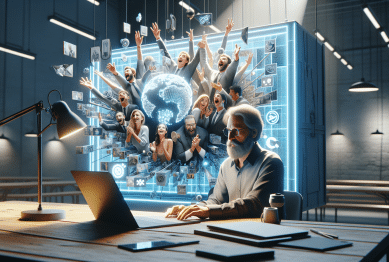In a world where information is plentiful and fast-moving, learning is no longer the rare skill—it’s rethinking that’s become difficult. We’re constantly nudged to acquire new knowledge, but far less encouraged to examine and update the beliefs we already hold. And in many cases, the harder challenge isn’t learning something new—it’s unlearning what we thought we knew.
From technology adoption to leadership decisions and even scientific research, the real competitive advantage today lies in cognitive flexibility. And yet, despite access to more evidence and tools than ever, we resist revising our thinking. This article explores why rethinking is harder than learning and offers strategies to make it easier and more habitual in a world defined by rapid change.

Why Is Rethinking So Hard?
To rethink, we must admit we were wrong or that we might be. That’s not just a rational hurdle—it’s an emotional and identity-based one. According to organizational psychologist Adam Grant, author of Think Again, rethinking activates different psychological mechanisms than learning. Learning is about adding to our knowledge. Rethinking requires us to question the foundation of what we already believe.
Here are several cognitive forces working against rethinking:
- Cognitive Dissonance: The discomfort of holding two conflicting ideas can lead us to defend the old belief rather than examine the new one.
- Confirmation Bias: We subconsciously seek information that supports our existing beliefs and ignore or discount evidence that contradicts them.
- Identity-Protective Cognition: Our beliefs become tied to our sense of self. Changing those beliefs can feel like a threat to who we are.
These forces are often unconscious. We think we’re being rational, but much of our resistance to rethinking comes from mental shortcuts designed to protect us from discomfort.
Rethinking Is a Skill—But Not an Intuitive One
Learning tends to feel additive and productive. Each time we consume a new podcast or read a new article, it feels like forward motion. Rethinking, by contrast, often feels like standing still or, worse, like moving backward.
That’s why schools, workplaces, and even personal habits reward learning behaviors—studying, note-taking, memorizing—but rarely teach us how to unlearn. In fact, research from the Harvard Business Review shows that senior leaders who fail are often those who could not update their assumptions quickly enough in light of new data.
So while learning gives us the thrill of acquiring something new, rethinking requires the humility to revise, and often discard, outdated assumptions. And humility, especially in competitive or high-stakes environments, is not always incentivized.
The Cost of Not Rethinking
Failure to rethink comes with both individual and societal consequences.
- In healthcare: Diagnostic errors are often traced back to doctors sticking with initial assumptions despite new evidence (known as anchoring bias). A study in BMJ Quality & Safety estimates that diagnostic error causes up to 80,000 deaths per year in the U.S. alone.
- In business: Companies that cling to outdated strategies tend to decline. Blockbuster, for instance, famously ignored early opportunities to rethink its DVD-centric model despite rising evidence of digital disruption.
- In personal development: Sticking to self-limiting beliefs (“I’m bad at math,” “I’m not creative”) can inhibit career growth and mental flexibility, especially in rapidly evolving fields like AI and digital literacy.
In short, rethinking isn’t a luxury—it’s a survival skill in a knowledge economy that rewards adaptability over static expertise.
How to Build the Habit of Rethinking
While rethinking may not be intuitive, it is learnable. Below are five science-backed strategies to help train your mind to rethink with agility.
1. Practice Confident Humility
According to Grant, the sweet spot for intellectual growth lies in confident humility—having enough confidence to act on your ideas, but enough humility to know they might be wrong.
One way to cultivate this is to frame beliefs as hypotheses rather than convictions. Instead of saying “This is the way,” reframe to: “This is my current understanding, and I’m open to revising it.” This opens the door to re-evaluation without ego loss.
Try this: After stating your position in a discussion, ask yourself: “What would make me change my mind?” Actively considering that possibility prepares you to be more flexible.
2. Seek Disconfirming Evidence
Most people search for evidence that supports what they already believe. In contrast, expert thinkers actively look for what might disprove their beliefs.
A paper published in Psychological Science found that those who deliberately sought out contradictory opinions were better problem-solvers in team settings.
Try this: Set up a “challenge network”—a group of colleagues or friends whose job is to question your assumptions. This encourages a culture of reflection rather than agreement.
3. Make Rethinking a Regular Practice, Not a Crisis Response
Too often, we wait until we’re forced—by a failure, criticism, or disruption—to question our approach. But effective leaders and thinkers build rethinking into their routine.
Try this: Set a quarterly “mental audit” where you revisit key beliefs in your work, relationships, or routines. Ask:
- What assumptions am I operating on?
- Have those assumptions changed?
- What am I holding onto that no longer serves me?
This keeps your mental operating system updated—before problems arise.
4. Use Analogies to Shift Perspective
When rethinking feels hard, analogy can act as a cognitive bridge. Studies from MIT’s Brain and Cognitive Sciences Department show that using analogies helps people break through stuck patterns by mapping unfamiliar ideas to familiar ones.
Try this: If you’re stuck on a belief or product strategy, ask: “What does this remind me of?” or “How would someone from a completely different domain solve this?”
Analogies allow you to rethink around a problem rather than through sheer force.
5. Separate the Idea from the Identity
Many of our hardest-held beliefs are identity-based: “I’m a product person,” “I’m a realist,” “I’m a data-driven manager.” These labels can be helpful—but also dangerous.
Rethinking is easier when we decouple our beliefs from our sense of self. You’re not your ideas. You’re the thinker behind them.
Try this: Treat intellectual positions like software—subject to updates. Thinking of yourself as a “work in progress” rather than a fixed identity can make rethinking less threatening.
The Emerging Trend: Rethinking as a Competitive Advantage
In a landscape where AI can outperform humans in raw information recall, the human edge lies not in memorization—but in mental agility.
Companies like Microsoft have begun integrating “learning days” and reflection tools into their workflows. In education, programs like “epistemic cognition training” are teaching students to think about how they think—not just what they know.
At the cultural level, platforms like Substack and Threads have created more room for real-time re-evaluation of ideas. People now publicly revise past opinions and archive old content—not as shameful reversals, but as markers of growth.
This signals a powerful shift: rethinking is becoming socially valued, not stigmatized. The ability to say “I’ve changed my mind” is emerging as a badge of wisdom, not weakness.
Conclusion
Learning is fast and rewarding. Rethinking is slow and uncomfortable. But in a world that changes faster than our assumptions, the harder skill is also the more vital one.
The ability to rethink—to pause, revise, and choose again—isn’t just a mental upgrade. It’s a form of resilience. And those who master it will lead, not just follow, the next wave of innovation and discovery.
References
- WDHB Studio (2025). The Neuroscience Behind Unlearning: Why the Best Learners Are Experts at Forgetting. https://wdhb.com/blog/the-neuroscience-of-unlearning-why-the-best-learners-are-experts-at-forgetting journals.sagepub.com+3wdhb.com+3poly.land+3
- Psychology Today (2024). The Power of Unlearning: Why Cognitive Biases Keep Us Stuck. https://www.psychologytoday.com/us/blog/beyond-school-walls/202410/the-power-of-unlearning Psychology Today+1Psychology Today+1
- Psychology Today (2016). The Struggle to Unlearn Psychology. https://www.psychologytoday.com/us/blog/feeling-our-way/201605/the-struggle-unlearn-psychology Psychology Today
- Educational Technology Review (2016). Unlearning with Technology. https://www.tandfonline.com/doi/full/10.1080/10494820.2016.1220052









